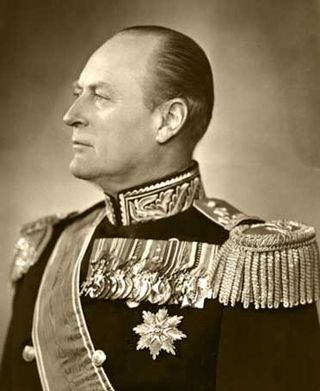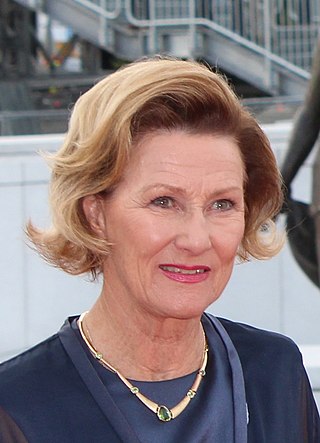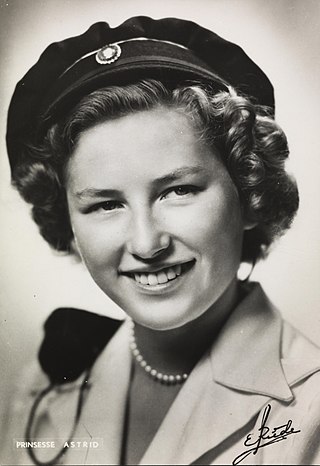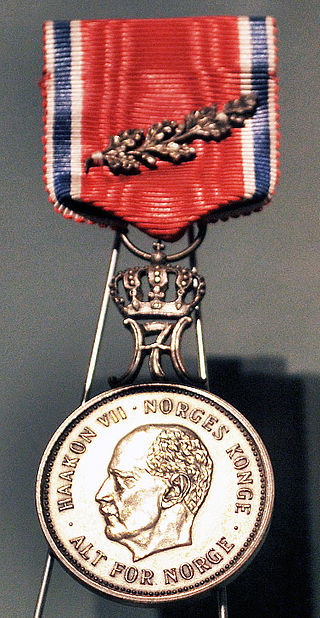
Haakon VII was King of Norway from 18 November 1905 until his death in 1957.

Olav V was King of Norway from 1957 until his death in 1991.

Harald V is King of Norway.

Haakon, Crown Prince of Norway is the heir apparent to the Norwegian throne. He is the only son of King Harald V and Queen Sonja.

Sonja is Queen of Norway as the wife of King Harald V.

Princess Astrid, Mrs. Ferner is the second daughter of King Olav V and his wife, Princess Märtha of Sweden. She is the older sister of King Harald V of Norway and younger sister of the late Princess Ragnhild.

Erling Sven Lorentzen was a Norwegian shipowner and industrialist. He founded Aracruz Celulose in 1968. He was the widower of Princess Ragnhild, the eldest child of King Olav V of Norway. In addition to being a Norwegian princess, his wife was in the line of succession to the British throne and occupied the 18th place at the time of her birth. Erling Lorentzen was a member of the Lorentzen family of shipping magnates.

Princess Ragnhild, Mrs Lorentzen, was the eldest child of King Olav V of Norway and Princess Märtha of Sweden. She was the older sister of King Harald V and Princess Astrid. She was the first Norwegian royal to have been born in Norway since the Middle Ages. In 1953 she married the industrialist Erling Lorentzen, a member of the Lorentzen family of shipping magnates. In the same year they moved to Brazil, where her husband was an industrialist and a main owner of Aracruz Celulose. She lived in Brazil until her death 59 years later.

The War Cross with Sword is the highest ranking Norwegian gallantry decoration. It is awarded for extraordinary brave actions or extraordinary leadership during combat. A recipient deemed worthy of additional citations will receive up to an additional two swords on the medal ribbon in addition to the "standard" single sword. Additional citations are rare: Gunnar Sønsteby is the only person to have received the War Cross with three swords.

The St. Olav's Medal and the St. Olav's Medal With Oak Branch were instituted by King Haakon VII of Norway on 17 March 1939. They are awarded in recognition of "outstanding services rendered in connection with the spreading of information about Norway abroad and for strengthening the bonds between expatriate Norwegians and their home country".

The War Medal is a Norwegian war decoration for service during Second World War, and later for meritous service during war.

The King's Medal of Merit is a Norwegian award. It was instituted in 1908 to reward meritorious achievements in the fields of art, science, business, and public service. It is divided in two classes: gold and silver. The medal in gold is rewarded for extraordinary achievements of importance to the nation and society. The medal in silver may be awarded for lesser achievements. The medal is suspended from a ribbon in the colours of the Royal Standard of Norway.

St. Olav's Medal with Oak Branch is a Norwegian military award, which was instituted by King Haakon VII of Norway on 6 February 1942. In Norway, the medal is considered as a separate award from the civilian St. Olav's Medal.

King Haakon VII's Medal of Liberty was established on 18 May 1945. The medal is awarded to Norwegian or foreign military or civilian personnel for significant service to Norway during World War II. This service need not have been in direct contact with the enemy.
Skule Valentin Storheill was a Norwegian naval officer who reached prominence in World War II while serving aboard Norwegian warships within the Royal Navy, and received Norway's highest military decoration, the War Cross with Sword.

Haakon VII 70th Anniversary Medal is a Norwegian military award, which was instituted by King Haakon VII of Norway on 27 October 1942. It was awarded in recognition of military personnel who served in the Norwegian armed forces in Britain on the 70th birthday of Norwegian King Haakon VII. The medal ranks 33rd in the Norwegian decoration order of precedence.
King Christian X's Liberty Medal was a commemorative decoration awarded by King Christian X for special services to Denmark during World War II.
The King Haakon VII 1905–1955 Jubilee Medal, also known as the King's Jubilee Medal, is a Norwegian award instituted in November 1955 by Haakon VII of Norway in honor of the 50th anniversary of his accession to the throne. The medal ranks 32nd in the Norwegian decoration order of precedence.
The Royal House Centennial Medal is a Norwegian award established by Harald V of Norway to commemorate the centennial of the Norwegian royal family. The day that it was established marks the hundredth anniversary of the day that Haakon VII arrived in Norway: November 25, 1905. The medal ranks 29th in the Norwegian decoration order of precedence.













